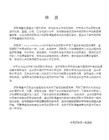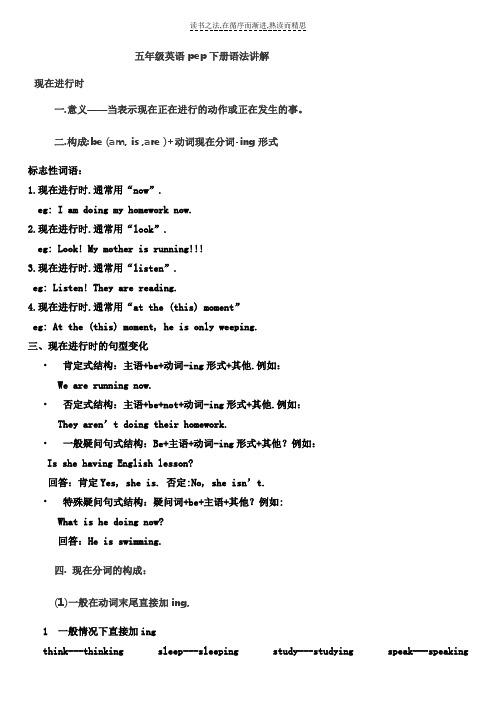新版PEP五年级下册常用表达法
- 格式:doc
- 大小:687.00 KB
- 文档页数:2

新版PEP五年级英语下册单词表带音标人教版五年级下册英语Unit1单词表eat breakfast /ˈbrekfəst/吃早饭have……class上……课play sports进行体育运动exercise/ˈeksəsaɪz/活动;运动do morning exercises 做早操eat dinner吃晚饭clean my room打扫我的房间go for a walk散步go shopping去买东西;购物take/teɪk/学习;上(课) dancing/ˈdɑ:nsɪŋ/跳舞;舞蹈take a dancing class 上舞蹈课人教版五年级下册英语Unit2单词表spring/sprɪŋ/春天summer/ˈsʌmə(r)/夏天autumn/ˈɔ:təm/秋天winter/ˈwɪntə(r)/冬天season/ˈsi:zn/季节picnic/ˈpɪknɪk/野餐go on a picnic 去野餐pick/pɪk/摘;采集pick apples 摘苹果snowman/ˈsnəʊmæn/雪人make a snowman 堆雪人go swimming去游泳人教版五年级下册英语Unit3单词表January/ˈdʒænjuər/一月February/ˈfebruər/二月March/mɑ:t/三月April/ˈeɪprə/四月May/meɪ/五月June/dʒu:n/六月July/dʒuˈlaɪ/七月August/ˈɔ:gəst/八月September/sepˈtembə(r)/九月October/ɒkˈtəʊbə(r)/十月November/nəʊˈvembə(r)/十一月December/dɪˈsembə(r)/十二月人教版五年级下册英语Unit4单词表first(1st)/fɜ:st/第一(的)second(2nd)/ˈsekənd/第二(的)third(3rd)/θɜ:d/第三(的)fourth(4th)/fɔ:θ/第四(的)fifth(5th)/fɪfθ/第五(的)twelfth(12th)/twelfθ/第十二(的)twentieth(20th)/’twentɪəθ/第二十(的)twenty-first(21st)/ˈtwenti: fə:st/第二十一(的)twenty-third(23rd)/ˌtwentɪ'θɜ:d/第二十三(的)thirtieth(30th)/'θɜ:tɪəθ/第三十(的)新版PEP五年级英语下册单词表带音标人教版五年级下册英语Unit5单词表mine/maɪn/我的yours/jɔ:z/你(们)的his/hɪz/他的hers/hɜ:z/她的theirs/eeəz/他们的;她们的;它们的ours/ˈaʊəz/我们的climbing/ˈklaɪmɪŋ/(climb/klaɪm/的ing形式)(正在)攀登;攀爬eating/ˈi:tɪŋ/(eat的-ing形式)(正在)吃playing/ˈpleɪɪŋ/(play的—ing形式)(正在)玩耍jumping/’dʒʌmpɪŋ/(jump/dʒʌmp/的—ing形式)(正在)跳sleeping/’sli:pɪŋ/(sleep/sli:p/的-ing形式)(正在)睡觉人教版五年级下册英语Unit6单词表doing morning exercises(正在)做早操having……class(正在)上……课eating lunch(正在)吃午饭reading a book(正在)看书listening to music(正在)听音乐keep/ki:p/保持某种状态keep to the right 靠右keep your desk clean 保持你的课桌干净talk quietly小声讲话turn/tɜ:n /顺序take turns 按顺序来The early bird catches the worm. 早起的鸟儿有虫吃。

最新人教版PEP五年级下册英语知识点复习总结Unit 1 My Day1.询问他人何时做某事的句型When do you + 动词(短语)原形 + 其他?(表示事件)I(+频度副词)+动词(短语)原形 + at + 时间点。
注意:询问第三人称单数何时做某事时,应将do改为does,其答语的主语为第三人称单数,动词部分应变为第三人称单数形式。
(以下情况同样需注意此项)例如:When does he get up。
He gets up at 6:00 a.m.译:他什么时候起床?他在上午六点起床。
2.询问他人周末做什么的句型What do you do on the weekend。
On Saturdays。
I (+频度副词) + 动词(短语)原形 + with sb(人)+ on Sundays。
I (+频度副词) + 动词(短语)原形 + with sb(人)+ on the weekend.3.play的用法体育运动:直接写运动项目,例如play basketballPlay乐器:先加the再加乐器,例如play the piano4.like的用法名词(n):喜欢某人或某物like to do sth:喜欢做某事(着重于某一次喜欢)XXX:喜欢做某事(着重于日常惯爱好)例如:I like reading。
but I do not like to read this evening.译:我喜欢读书,但是今晚我不想读。
5.be good…的区别XXX擅长be good to对…好for有益于6.动词变第三人称单数的变化规则1) 一般情况下,动词后面直接加-s;例如work-works。
live-lives。
play-plays。
sing-sings把y变为i再加-es;2) 以辅音字母+y结尾的动词;例如study-studies。
try-tries。
carry-carries。
fly-flies。

重点语法A) 一般现在时1. 概念:一般现在时表示经常的、习惯性的动作或存在的状态。
2. 构成:一般现在时的构成主要有两种形式:(1)be型:句子的谓语动词只有be(am,is或are):a.肯定句中,只出现be,如:I am a student.我是一名学生。
b.否定句中,要在be后面加not,如:She isn't a teacher.她不是教师。
c.一般疑问句,要将be放在句子开头(注意句首字母大写),句尾用问号,答语用Yes,主语+be.或No,主语+ be + not.如:—Are you ready?—你准备好了吗?—Yes,I am.—是的,我准备好了。
(—No,I'm not.—不,我没准备好。
)(2)实义动词型:句中的谓语动词为实义动词(也叫行为动词):a.肯定句中,只出现实义动词,如:I get up in the morning.我早晨起床。
.否定句中,要在实义动词前面加do(does)+not,do(does)作助动词,本身无意义,常与not缩写成don't(doesn't),如:I don't like vegetables.我不喜欢蔬菜。
c.一般疑问句,要在句子开头加助动词Do(does),句尾用问号,简略答语用Yes,主语+do(does).或No,主语+do(does)+not.如:—Do you like oranges?—你喜欢桔子吗?—Yes,I do.—是的,我喜欢。
(—No,I don't.—不,我不喜欢。
) 3. 一般现在时的用法1) 经常性或习惯性的动作,常与表示频腮度的时间状语连用。
时间状语:every…, sometimes, at…, on Sunday I leave home for school at 7 every morning. 2) 客观真理,客观存在,科学事实。
The earth moves around the sun. Shanghai lies in the east of China.3) 表示格言或警句中。

人教版小学PEP英语五年级下册知识点归纳PEP五年级英语下册各单元知识点Unit 1 My day一、重点词汇。
五、重点句型。
1、询问别人什么时候做某事的句型及回答。
句型结构:问:When do you+动词短语原形+其他?(你/你们什么时候做某事?)答:I/We(+频度副词)+动词短语原形+at+具体时间(我/我们通常在几点做某事。
)例:问:When do you go to bed?(你什么时候上床睡觉?)答:I go to bed at 9:00p.m (我晚上9点上床睡觉。
)注意:当主语是第三人称单数(he,she,it,单个人名或单数名词)时,助动词do 要变成does,句型结构是:When does+主语(第三人称单数)+动词短语原形+其他?2、询问别人周末做什么的句型及回答。
句型结构:问:What do you do on theweekend?(你周末做什么?)答:I(+频度副词)+动词(短语)+其他。
例:问:What do you do on theweekend?(你周末做什么?)答:I usually read books. (我通常看书。
)注意:当主语是第三人称单数(he,she,it,单个人名或单数名词)时,助动词do 要变成does,句型结构是:What does+主语(第三人称单数)+do+on the weekend?六、四会句子:When do you finish class in the morning ? 你们上午的课到几点结束?We finish class at 1 o’clock . 我们一点钟结束上午的课。
What do you do on the weekend ? 你周末做什么?I often watch TV and play ping-pong with my father . 我经常看电视,也常和我爸爸一起打乒乓球。
七、语音:cl /kl/ clean clock class cleverpl /pl / plate eggplant please play Unit 2 My favourite season三、重点句型1、询问别人天气怎么样的句型及回答。

(PEP)小学英语56年级常用表达(必背)五年级上册:1. Is he young?No, he isn't.2. What would you like to eat?A sandwich, please.3. What's she like?She's kind.4. What would you like to drink?I'd like some water.4. What's your favourite food?Noodles. They're delicious.5. What do you have on Thursdays?I have maths, English and music.6. What can you do for the party, children?I can sing English songs. 我会唱英文歌。
7. Do you often read books in this park?No, I don't. 不,我不经常在这里看书。
8. Can you do any kung fu, John?yes, I can. 是的,9. There is a big bed.10. There are so many pictures here.11. Is there a river in the forest, Miss White?No, there isn't.12. Are there any tall buildings in the nature park?No, there aren't.五年级下册:1.When do you finish class in the morning?We finish class at 1 o’clock.2.What do you do on the weekend?I often watch TV and play pingpong with my father.3.–Which season do you like best, Mike??winter.4.–Why?Because I like summer vacation.5.When is the party?It’s in April.6.When is the trip this year?It’s in October. We’ll go to the Great Wall.7.When is the art show?It’s on May 1st.8.When is your birthday?It’s on April 4th.9.The yellow picture is mine.10.Are these all ours?11.–Whose is it?It’s Zhang Peng’s.12.Is he drinking water?No, he isn’t. He’s eating.13.What are they doing?They are eating lunch.14.What is the little monkey doing?It’s playing with its mother.15.Shhh, talk quietly.16.Keep your desk clean.六年级上册:17.Where is the museum shop?It's near the door.18.How can we get there?Turn left at the bookstore.19.How do you e to school?Usually, I e on foot.20.In the USA people on bikes must wear one.21.Don't go at the red light!22.I must pay attention to the traffic lights.23.What are you going to do tomorrow?I'm going to have an art lesson.24.We're going to draw some pictures in Renmin Park. 我25.Where are you going?We're going to the cinema.26.When are you going?27.What are Peter's hobbies?He likes reading stories.28.Does he live in Sydney?No, he doesn't.29.Does he like doing word puzzles and going hiking?Yes, he does. 是的,30.What does he do?He's a businessman.31.Where does he work?He works at sea.32.How does he go to work?He goes to work by bike.33.They're afraid of him.34.The cat is angry with them.35.What's wrong?Your father is ill.36.He should see a doctor this morning.37.Don't be sad.六年级下册:38.It was good, thank you.39.That's the tallest dinosaur in this hall.40.It's taller than both of us together.41.How tall are you?I'm 1.65 metres.42.What size are your shoes, Mike?Your feet are bigger than mine. My shoes are size 37.43.How heavy are you?I'm 48 kilograms.44.How was your weekend?It was good. Thank you.45.What did you do?I stayed at home with your grandma. We drank tea in the afternoon and watchedTV.46.Did you do anything else?Yes, I cleaned my room and washed my clothes.47.I want to buy the new film magazine.48.What did you do last weekend? Did you see a film?No, I had a cold. I stayed at home all weekend and slept.49.What happened?50.Are you all right?I'm OK now.51.Where did you go?52.It looks like a mule!53.Did you go to Turpan?Yes, we did.54.How did you go there?We went there by plane.55.There was no library in my old school.56.Tell us about your school, please.57.How do you know that?58.There were no puters or Internet in my time.59.Before, I was quiet. Now, I'm very active in class.60.Sounds great!61.I was short, so I couldn't ride my bike well. Now. I go cycling every day.。

五年级英语pep下册语法讲解现在进行时一.意义——当表示现在正在进行的动作或正在发生的事。
二.构成:be (am, is ,are )+动词现在分词-ing形式标志性词语:1.现在进行时.通常用“now”.eg: I am doing my homework now.2.现在进行时.通常用“look”.eg: Look! My mother is running!!!3.现在进行时.通常用“listen”.eg: Listen! They are reading.4.现在进行时.通常用“at the (this) moment”eg: At the (this) moment, he is only weeping.三、现在进行时的句型变化•肯定式结构:主语+be+动词-ing形式+其他.例如:We are running now.•否定式结构:主语+be+not+动词-ing形式+其他.例如:They aren’t doing their homework.•一般疑问句式结构:Be+主语+动词-ing形式+其他?例如:Is she having English lesson?回答:肯定Yes, she is. 否定:No, she isn’t.•特殊疑问句式结构:疑问词+be+主语+其他?例如:What is he doing now?回答:He is swimming.四. 现在分词的构成:(1)一般在动词末尾直接加ing,1 一般情况下直接加ingthink---thinking sleep---sleeping study---studying speak---speakingsay---saying(2)以不发音字母e结尾的动词,先去掉e,再加ing,如skate →skating make →making dance → dancing write → writing have →having ride → riding come → coming(3)以重读闭音节结尾的动词,中间只有一个元音字母,词尾只有一个辅音字母,应双写末尾的辅音字母,再加ing, 如:putting running beginning stopping swimming shopping joggingsitting getting forgetting letting4 以ie结尾的动词,把ie改为y ,再加ingdie---dying lie---lying五、现在进行时的用法(1)用来表示说话时正在进行或者发生的动作,例如:Mother is cooking in the kitchen.妈妈在厨房里煮饭。
五年级下册常用表达法Unit 1 When do you finish class in the morning?你们上午的课到几点结束?We finish class at 1 o’clock.我们一点结束上午的课。
What do you do on the weekend?你周末做什么?I often watch TV and play ping-pong with my father.我经常看电视,也常和爸爸打乒乓球。
Unit 2Which season do you like best Mike?迈克,你最喜欢哪个季节?Winter.冬天。
Why?为什么?Because I like summer vacation!因为我最喜欢暑假。
Unit 3When is the part?聚会什么时候举行?It’s in April.在四月。
When is the trip this year?今年的(秋)游在什么时候?It’s in October. We’ll go to the Great Wall.在十月,我们将去长城。
Unit 4When is April Fool’s Day?愚人节是哪天?It’s on April 1st.它在四月一日。
When is your birthday?你的生日是哪天?My birthday is on April 4th 我的生日是四月四日。
Unit 5The yellow picture is mine. 黄色的图画是我的。
Are these all ours?这些都是我们的画吗?Whose is it?这是谁的?It’s Zhang Peng’s.它是张鹏的。
Is he drinking water?它在喝水吗?No, he isn’t. He’s eating.不是,他在吃东西。
Unit 6What are they doing?他们在干什么?They’re eating lunch!他们在吃午饭。
易错知识点整理:1.like 喜欢句型结构:①主语+like+sth./sb. 例:I like ice cream. 我喜欢冰淇淋。
②主语+like(s)+doing sth.例:①I like running. 我喜欢跑步。
②He likes making a snowman in winter.他在冬天喜欢堆雪人。
2.and与or, but与because1)and “和“表示并列的关系,两者都被包含;or”或者“含选择意义,两者选其一。
例:①The winter vacation is in January and February. 寒假在一月和二月。
②Mid-Autumn is in September or October.中秋节在九月或者十月。
2)but“但是“,表示转折,be cause”因为”,表示解释前一句的原因。
例:①I like summer, but I can’t swim. 我喜欢夏天,但是我不会游泳。
②I like summer, because I can go swimming every day. 我喜欢夏天,因为我可以每天去游泳。
3.have的用法1)h ave +一日三餐, 表示”吃…餐” ,与eat一样,如:eat/have breakfast吃早餐2)h ave…class 上…课,结构:have +名词/动名词(动词ing)+class例:have Chinese class上语文课have art class 上美术课have swimming class 上游泳课have dancing class上舞蹈课4.go+动名词(动词-ing)表示”去…”go swimming 去游泳go running 去跑步go shopping 去购物go fishing 去钓鱼go dancing 去跳舞5.There be(is,are)... 意为”…有..”一般指“某地方有某人或某物。
PEP小学英语五年级下册期末复习语法知识点专题基本语法知识1.一般现在时,表示经常或习惯做的事。
频度副词:always 总是usually 经常often 时常sometimes 偶尔always>usually > often>sometimes构成形式:主语+ 动词原形。
I always go to school at 7:00a.m.我总是7点去学校。
We often eat lunch at school. 我们时常在学校吃午餐。
They usually go to the park on the weekend.他们通常周末去公园。
^2.go 组成的词组有:go swimming 去游泳go hiking 去远足go running 去跑步go shopping 去购物play+球类运动:play basketball 打篮球play football踢足球play ping-pong 打乒乓球play sports 做运动play the + 乐器: play the pipa play the guitar 弹吉他play the piano 弹钢琴do 组成的词组:do homework do kung fu do morning exerciseshave 组成的词组:have class 上课,have breakfast/lunch/dinner吃早/午/晚饭3.wh-和how疑问词:who 谁whose谁的when 什么时候where 在哪里how 怎么样%why 为什么how much 问价格how many 问数量which 哪一个4.表示在星期几用on ,如on Monday. 表示在具体某一天用on. 如on March 1st表示在几月份用in ,如in March. 表示在一天中的上午下午晚上用in. in the morning 在早上, in the afternoon 在下午,in the evening 在傍晚。
五年级下册英语第三单元常用表达法Unit 3 of the fifth grade English textbook is all about common expressions and phrases that are frequently used in daily communication. In this unit, students will learn how to use these expressions in various situations to improve their language skills. Let's take a look at some of the common expressions and how they can be used in different contexts.1. Greetings:- Hello! How are you?- Good morning/afternoon/evening- How are you doing?2. Asking for help:- Can you help me, please?- Could you lend me a hand?- I need some assistance3. Making requests:- Can I borrow your pencil?- Could you pass me the salt, please?- Would you mind shutting the door?4. Expressing gratitude:- Thank you so much!- I really appreciate your help- Thanks a million!5. Apologizing:- I'm sorry for my mistake- Please forgive me- I apologize for the inconvenience6. Expressing opinions:- In my opinion, the movie was fantastic - I believe that we should study harder - Personally, I prefer winter to summer 7. Describing preferences:- I like watching TV in my free time- I enjoy playing soccer with my friends - My favorite subject at school is math8. Giving directions:- Go straight ahead and turn left at the corner- The supermarket is on the right side of the street- Take the bus to the last stop and walk three blocks9. Making invitations:- Would you like to come to my birthday party?- How about going to the movies this weekend?- Let's have lunch together tomorrow10. Ordering food:- I'll have a cheeseburger and fries, please- Can I have a chicken salad, please?- May I order a slice of pizza?These are just a few examples of the many common expressions that students will learn in Unit 3 of the fifth grade English textbook. By practicing these expressions regularly, students will be able to communicate more effectively in English and expand their language skills. Remember to use these expressions in everyday conversations to improve your language fluency and confidence. Good luck!。
新版P E P五年级下册
常用表达法
work Information Technology Company.2020YEAR
五年级下册常用表达法
Unit 1
When do you finish class in the morning?
你们上午的课到几点结束?
We finish class at 1 o’clock.
我们一点结束上午的课。
What do you do on the weekend?
你周末做什么?
I often watch TV and play ping-pong with my father.
我经常看电视,也常和爸爸打乒乓球。
Unit 2
Which season do you like best Mike?
迈克,你最喜欢哪个季节?Winter.
冬天。
Why?
为什么?
Because I like summer vacation!
因为我最喜欢暑假。
Unit 3
When is the part?
聚会什么时候举行?
It’s in April.
在四月。
When is the trip this year?
今年的(秋)游在什么时候?
It’s in October. We’ll go to the Great Wall.
在十月,我们将去长城。
Unit 4
When is April Fool’s Day?
愚人节是哪天?
It’s on April 1st.
它在四月一日。
When is your birthday?
你的生日是哪天?
My birthday is on April 4th
我的生日是四月四日。
Unit 5
The yellow picture is mine.
黄色的图画是我的。
Are these all ours?
这些都是我们的画吗?
Whose is it?
这是谁的?
It’s Zha ng Peng’s.
它是张鹏的。
Is he drinking water?
它在喝水吗?
No, he isn’t. He’s eating.
不是,他在吃东西。
Unit 6
What are they doing?
他们在干什么?
They’re eating lunch!
他们在吃午饭。
What’s the little monkey doing 那只小猴子在干什么?
It’s playing with Its mother!
它在和妈妈玩耍。
Shh.Talk quietly.
嘘,小声讲话。
Keep your desk clean.
保持桌面整洁!
2。